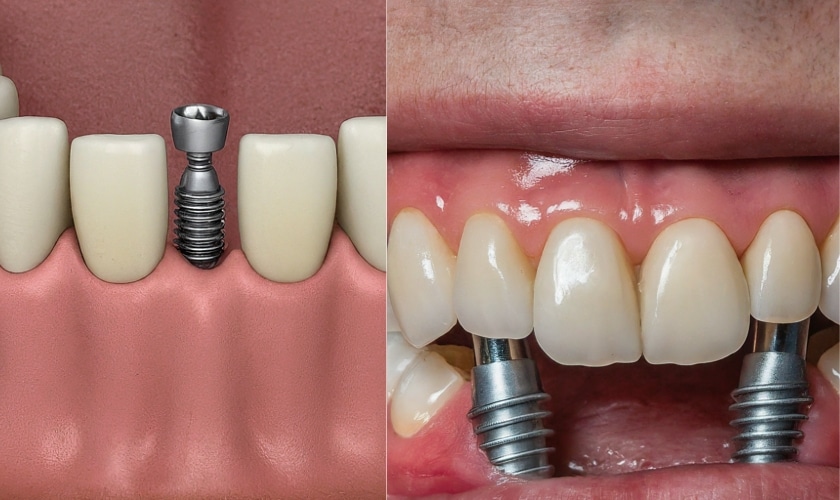Dental Sense Things To Know Before You Get This
Dental Sense Things To Know Before You Get This
Blog Article
Dental Sense - An Overview
Table of ContentsHow Dental Sense can Save You Time, Stress, and Money.6 Easy Facts About Dental Sense ShownExcitement About Dental SenseDental Sense for Dummies
are clinical gadgets operatively implanted right into the jaw to restore an individual's capability to chew or their appearance. They offer support for artificial (phony) teeth, such as crowns, bridges, or dentures. When a tooth is shed as a result of injury or illness, a person can experience complications such as quick bone loss, faulty speech, or adjustments to chewing patterns that cause pain.Oral dental implant systems consist of a dental implant body and dental implant joint and may additionally include a joint addiction screw. Cosmetic dentistry services. The oral implant body is surgically put in the jawbone instead of the tooth's origin. The dental implant abutment is normally attached to the implant body by the abutment fixation screw and expands through gum tissues right into the mouth to sustain the affixed artificial teeth
(https://ameblo.jp/dentalsense1/entry-12882048969.html)Structure of The Dental Implant System selecting dental implants, speak with your dental copyright about the possible advantages and dangers, and whether you are a prospect for the treatment. Things to take into consideration: Your total wellness is a vital factor in identifying whether you are a great prospect for oral implants, how much time it will certainly take to recover, and for how long the implant may remain in location.
Smoking may impact the recovery process and reduce the long-term success of the implant. The recovery process for the implant body may take numerous months or longer, throughout which time you generally have a momentary joint instead of the tooth. the oral implant procedure: Carefully follow the dental health instructions provided to you by your oral service provider.
How Dental Sense can Save You Time, Stress, and Money.
Implant failure can lead to the requirement for another procedure to take care of or change the implant system. Brings back the capacity to chew Brings back aesthetic appearance Helps keep the jawbone from reducing because of bone loss Maintains the health of the bordering bone and gums Assists keep nearby (neighboring) teeth stable Enhances top quality of life Damages to surrounding all-natural teeth throughout implant placement Injury to the surrounding tissues during surgery, such as sinus perforation Injury throughout surgery (as an example, fracture of surrounding jawbone) Poor function, such as seeming like the teeth do not bite together typically A feeling that the tooth hangs or turning in position resulting from a joint screw loosening Implant body failing (looseness of the implant body) due to systemic infection, which might be much more most likely in individuals with unrestrained diabetics issues because of regional infection in bone and gums sustaining the implant body as a result of postponed healing, which may be much more likely in people who smoke Difficulty cleaning the gums around the implant, causing bad dental hygiene Untreated gum disease Post-surgical tingling due to nerve impingement or damages Constantly notify healthcare carriers and imaging service technicians that you have dental implants prior to any kind of magnetic resonance imaging (MRI) or x-ray procedures.
FDA is not familiar with any type of adverse events reported for MRI or x-ray treatments with dental implants. Oral implants systems are usually constructed from materials that follow worldwide consensus criteria of the International Company for Standardization (ISO) or ASTM International. These criteria have information of what makes a safe visit this page product.

A dental implant is a structure that replaces a missing out on tooth. With screw-like tools, the doctor inserts a dental implant right into the jawbone, and it acts as an anchor for a fabricated tooth, called a crown.
The Buzz on Dental Sense
Some people are not eligible for dental implant surgical procedure. It is for oral doctors to operate people with: intense illnessuncontrollable metabolic diseasebone or soft cells illness or infectionIf these concerns are fixed, an individual can have the surgery. In, dental cosmetic surgeons avoid from operating people with: If individuals with any of the above undergo oral implant surgical procedure, there is a greater danger of the implant stopping working.

Oral dental implant surgery is an individualized process. It's not the exact same for everybody. The adhering to provides a basic introduction of what you can anticipate your dental practitioner, oral doctor, periodontist or prosthodontist to do: Put the implant operatively. Provide you time to recover. Connect the article and final crown, bridge or denture.
Next off, your cosmetic surgeon will meticulously place the dental implant into your jaw. If your dental implant is near the front of your mouth, your dental practitioner will make a momentary tooth for you to wear until you heal.
9 Simple Techniques For Dental Sense
Throughout the healing stage, your jawbone ought to fuse to the oral implant. This procedure can take anywhere from three to nine months.
As soon as your implant heals, your dental expert can affix the joint (small adapter post) and your last repair (crown, bridge or denture). This normally takes about one hour to complete and might need a 2nd minor surgery. You should not feel any discomfort during your oral implant procedure due to the fact that your provider will use drug to numb your gum tissues.
Report this page